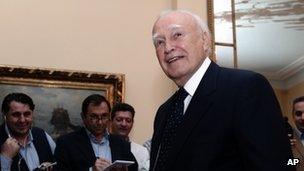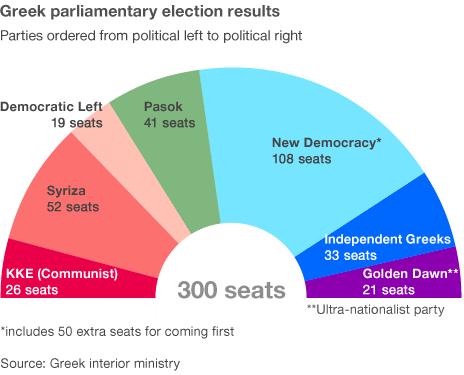Greece to hold new election on 17 June
- Published

President Papoulias appointed a senior judge to take over the running of the country
Greece will hold fresh elections on 17 June and a judge has been appointed to head an interim government.
Council of State president Panagiotis Pikramenos will head the caretaker government until the election.
The election date was announced after party leaders met Greek President Karolos Papoulias on Wednesday.
Final talks to form a coalition failed on Tuesday, raising new concerns over Greece's eurozone future. No party won a majority in the 6 May election.
There has been deadlock since the election over whether to continue with the austerity measures required by an international bailout agreement.
Recent opinion polls suggest that Syriza, a leftist bloc opposed to the tough bailout conditions, would win a new election, but would still not gain enough for a parliamentary majority. It came second on 6 May.
The uncertainty pushed the euro to a new four-month low against the dollar on Wednesday.
EU officials fear Greece will elect an anti-bailout government, which could trigger a Greek exit from the euro. That possibility is now discussed openly among Europe's leaders, the BBC's Mark Lowen in Athens says.
Carsten Brzeski: EU leaders "whistling in the dark"
But a senior adviser to European Council President Herman Van Rompuy played down the possibility.
"We're not planning for a Greek exit, nobody is planning for a Greek exit," Richard Corbett told BBC Radio 4's Today programme.
"That would not help Greece, it would not help the rest of the European Union and technically by the way, it's an extraordinarily difficult thing to do. The idea of planning a Greek exit would risk being a self-fulfilling prophecy."
Markets jittery
On Wednesday the eurozone crisis pushed Asian stocks lower and knocked oil prices.
Tokyo's Nikkei index dropped 1%, while Hong Kong's Hang Seng and South Korea's Kospi lost about 3%.
The euro fell more than half a cent to $1.27.
Meanwhile the borrowing costs for Spain and Italy rose again, with Spanish bond yields hitting 6.5% and Italy's 6.1%.
The uncertainty over the euro has also sparked concern over a run on the banks in Greece.
Greek newspapers report that around 700m euros (£558m; $897m) has been withdrawn from high street banks over the past few days, the BBC's Richard Galpin in Athens says.
People are concerned that an exit from the eurozone and a reversion to the drachma would wipe out much of their savings, he says.
European leaders say they will cut off funding for Greece if it rejects the bailout agreed in March.
This would mean effective bankruptcy for Greece and its all but certain exit from the euro, analysts say.
German Finance Minister Wolfgang Schaeuble stressed again on Wednesday that there would be no new discussions on Greece's bailout.
The head of the International Monetary Fund, Christine Lagarde, has raised the possibility of orchestrating an "orderly exit" for Greece from the eurozone.
"It is something that would be extremely expensive and would pose great risks, but it is part of options that we must technically consider," she said on Tuesday.
After talks in Berlin with German Chancellor Angela Merkel following his inauguration as French president, Francois Hollande said he wanted Greece to remain in the euro.
'Timely payment'
The Syriza bloc wants to renegotiate the bailout package but also wants to keep Greece in the euro.
Pasok and New Democracy, which signed up to the bailouts and had previously dominated Greek politics for decades, saw their combined share of the vote drop from about 77% to about 33% on 6 May.
On Tuesday, Greece said it would make a "timely payment" on 435m euros' worth of debt due on 15 May.
